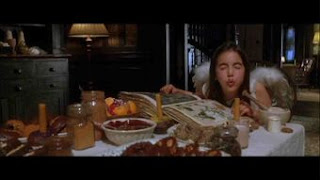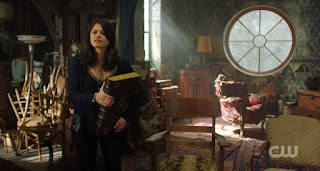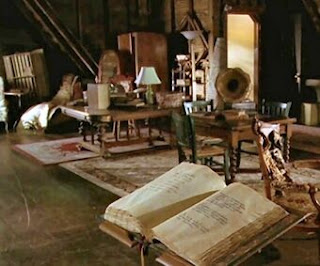The idea of lore as unknown or secret knowledge passed down through generations is not a new one, neither is its embodiment in a book. However, how it is gendered is different. In movies and television shows like Practical Magic (1998), Charmed (1998-2006), The Witches of East End (2013-2014), and the reimaging of Charmed (2018-present) all feature a family spell book or book of shadows that allows the ancestors to pass down their generational knowledge and in many cases speak directly to them.








The women in these stories are never alone because their mothers and grandmothers continue to guide them, through ghostly forms and the books they hold.
These physical books are tied to gendered, physical spaces. In Practical Magic and The Witches of East End it is the surprisingly similar looking kitchen. The line between making and creating food and making and creating magic is non-existent. It's an idea 1999's Simply Irrestible made explicit with the character of Amanda, a horrible cook trying to save her dead mother's neighborhood restaurant. She is only able to create great food and magic once she puts on her mom's earrings, and suddenly her food is magical.


Practical Magic and The Witches of East End don't take it that far, although magic tequila does make an appearance. Instead the kitchen is presented as the center of a house, a home, the woman's place. These presentations do not denigrate the place or the work done there, instead these gendered places are places of power. The spell books and herbs as at place as the cookbooks and spices.


The books the women consult are creations in and of themselves. These are not pages fresh off a computer printer, attached by glue stick, these are heavy-weight pages written on using a serious pen, enclosed in leather. The books are creations that show care and work in their transmission of knowledge. They are also books that include the future, with the majority of the pages left blank for future generations to fill. These tomes are weighty, both in actual physicality, the characters often struggle to hold, carry, and navigate these books, and for the knowledge they contain. The women do not make Faustian choices, trading their souls for the knowledge of these books, but they do constantly face decisions on how to use the knowledge. The repeated idea of "do no harm" and that there are consequences for using magic for personal gain. The Charmed series does this the most explicitly although all of them feature some version of this throughout their runs. While the women
While many of these portrayals conform to traditional perception of women's work and women's spaces, there is some pushback against these gendered constructions. In addition to the kitchen as foundational spaces for creation both versions of Charmed feature attic spaces where the women often go to do what is portrayed as more "serious" and less day-to-day spellwork. This physical space has more in common with tower labs gendered male. Those spaces also blend and cross boundaries, science and magic, book knowledge with the personal experience of experiments. The current reimaging of Charmed does this through the character of Macy who is a scientist, with a PhD, who blurs these sames lines. Yet this work is not limited to her in the show, both her sisters and her mother before them are shown performing spells in the attic space. In the original Charmed all three sisters performed spell work in the attic.
Even when these characters push into these traditionally male coded spaces they are not required to act male to do so, they remain inherently themselves. In this way these shows differ from other genre shows like horror or science fiction that often require their women to discard their femininity in order to participate in male spaces or acquire skills or knowledge traditionally considered the domain of men. These attic spaces themselves provide clues to this, padded, rounded furniture, homemade candles, couches, rugs that soften the space. These attics are also the repository of childhood toys and relics rather than more scientific specimens or equipment.


Returning to Supernatural, we can see that the lore is gendered here too. From the first season Sam is presented as less than Dean, less of a man because he initially chose a "normal" life over demon hunting, he chose college over the road, a life alone over family. Dean performs in a traditional masculine manner while Sam is shown as soft, weak, and fails to live up to this manly ideal. This contrast and construction is seen in Sam as the interpreter and research of the Lore. Journals are generally gendered, as is research as we see above. Sam as the keeper of John's journal, and the main researcher, is feminized by the Lore, a traditionally feminine, and weaker role, despite the Lore and Sam's use of these skills granting him knowledge that provides an advantage. From the first episode Dean is portrayed as the typical man while Sam is somehow less than.


Yet the women described above are a helpful lens to reconsider Sam and his interaction with the Lore. Sam ultimately holds the power. Dean may be a guys guy but Sam is able to think through, think ahead, first because of his possession and use of John's journal and later because he uses the computer, both for hacking and fact finding, coming to blend both types of knowledge as the seasons move on.
If we separate these portrayals from our initial gendered reactions and judgments we can reconsider the Lore itself. The Lore as knowledge is not a weapon of offense, of violence, but is often a way to see the truth, make informed decisions, guide people. Yet the Lore can also be used to defeat, kill, send villains back to hell. The variety of use seems to depend on the vehicle. Charmed used the Book of Shadows to vanquish demons on a weekly basis, their murders never given an ethical thought. The reboot on the other hand shows murder and vanquishing of enemies as something only evil characters do. The Witches of East End made similar arguments about murder, and Practical Magic certainly showed that there were serious ethical considerations around death, and severe consequences for murder, even if it was justified. In each of these works the Lore is used to varying degrees of offensive actions, with the knowledge generally used in a balanced manner, as much to help as harm.
Supernatural on the other hand has spent 15 years pretty much killing with impunity. They're demons and monsters, not worthy of ethical considerations, although there have been a few episodes where Sam, Dean, and friends, are on opposite sides of this argument. For the boys the Lore is a weapon to make their monster hunting more effective, as seen with the introduction of the Men of Letters and their base in season eight. These additions made the Lore exponentially more powerful, for its reach through time and across the globe. The size of the library, the specimens, these physical objects always playing in the background on the set emphasize the weight of the Lore, its ongoing presence. Sam and Dean are surrounded by the evidence of the Lore, its purpose, its power. Here the Lore is not feminine or masculine but rather seems to represent all the Men of Letters throughout the years who have used the Lore to fight against evil, and added their own knowledge to the cause.
Taken as a whole generational knowledge in the form of journals and books and ghostly advice offers a measured, balanced approach to knowledge and actions. There is a great amount of knowledge out there, available to any who would seek it, but this knowledge represents great power, great responsibility, and great consequences, for good and ill, if used. It is a power and knowledge inherently grounded in feminine spaces and practices, but this does not mean that use of the Lore feminizes the user or is less than other forms of knowledge of power. Instead, it seems to offer a middle way, one of moderation that reembraces or reinscribes the power of the home and passing on our stories to the next generation. Voices they may need if we are not here to share them ourselves.




No comments:
Post a Comment